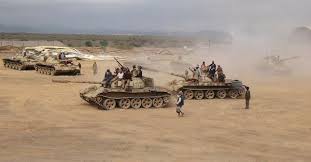When the Deputy Chief of Staff of the Iranian Armed Forces was asked if his country will send military advisers to Yemen as it had to Syria, his answer came far from negative. He said that Tehran acknowledges its responsibility in both countries.
Iran has been present in Yemen before the coup against President Abd Rabbuh Mansur Hadi’s government last year, and its expanded presence is a major reason why Saudi Arabia built a military alliance and launched a war there, especially when Saudi Arabia confirmed its suspicions that Iran was behind the Houthis’ seizure of the capital and was sending “military consultants” and huge shipments of arms to support them.
After its proxy seized power with the help of forces loyal to Hadi’s predecessor Ali Abdullah Saleh, Tehran said there would be a daily flight to Sanaa, starting from one per week. Iran’s only exports to Yemen are arms and militants.
Even after the war erupted, Sanaa’s airport was closed and the United Nations were inspecting all ships heading to Yemen, Iran continued to send arm shipments in various means.
Australia on Tuesday said its navy found an arms cache on a ship heading from Iran to Yemen. Moreover, ten days ago, US Secretary of State John Kerry told the Congress that another Iranian ship was intercepted. Of course, it costs Tehran a small amount of money to rent ships and repeat its attempts.
All this suggests that it wants to turn Yemen into another Syria and into a battlefield for Iran-linked militias from Afghanistan to Lebanon!
The question is will Iran dare to expand the circle of fighting and take it to outskirts of Yemen?
Tehran seems to be sending a message after positive developments regarding Yemen, such as negotiations, prisoner exchanges and delivery of aid for the first
time. Iran either wants to destroy this progress or grant more leverage to its allies, who have lost more than half the territories they had seized.
Reconciliation in Yemen will increase pressure on Iran in other conflict zones such as Syria, so it is in Tehran’s interest to keep the fighting going in order to distract Gulf States in this war. Iran hopes to achieve victory in Syria, where it is fighting alongside Russia.
If we consider the worst case scenario, which is Iran sending its troops to Yemen and expanding war zone there, will Iran really win in Yemen?
Reality is that there is much evidence that Iran has been present in Yemen before the war, represented by Lebanese proxy, Hezbollah.
Yemen resembles Afghanistan in its rugged terrain, complicated tribalism and difficulty of transportation. Thus, Tehran would be committing a mistake by sending more arms and militants to the country. Although this would complicate the situation for Saudi Arabia and its allies, yet Iran’s losses would be great.
At the beginning, many people doubted that Iran was involved in Yemen, but today we rarely hear an expert denying the role it has played throughout the crisis. The case is the same when it comes to Syria, Bahrain and Iraq.
Iran does not lack courage to get more involved in Yemen, but this will backfire on it militarily and politically. Perhaps this is what Riyadh needs in order to prove that Iran’s threat has increased after the nuclear deal – to besiege the Iranians in the mountains and plains of a country that is resistant to invaders.
